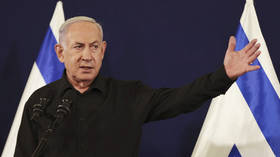
One diplomatic channel is being maintained by Qatar, with Doha describing it as “instrumental” in mediation efforts

Israeli army soldiers stand by a tracked vehicle at a position in the upper Galilee region of northern Israel on October 28, 2023. © Jalaa MAREY / AFP
Negotiations between Israel and the Palestinian armed group Hamas are continuing despite West Jerusalem’s decision to expand its ground operations in Gaza, Reuters reported on Saturday, citing sources.
According to a person familiar with the diplomatic process, the de-escalation talks mediated by Qatar, which has close ties to Hamas and hosts its political bureau in Doha, have not broken down but are now proceeding at a “much slower pace.”
Speaking to CNN on Saturday, Qatari Foreign Ministry spokesman Majed al-Ansari confirmed backchanneling, saying that “various sides” had pushed Doha to help maintain ties between the two belligerents. “This channel has been very instrumental in countering the escalations that took place,” he said, adding that “as long as this channel is useful in creating peace,” “we cannot afford to lose it.”
The official emphasized that it “is the only way that we are mediating the release of… hostages” held by Hamas. Still, he lamented that the escalation on the ground was making the situation “considerably more difficult.”

Read more
Since the beginning of the violence on October 7, the militant group has captured more than 200 people, including soldiers, civilians, and foreign nationals.
Qatar has previously played an instrumental role in securing the release of four Hamas hostages, including a mother and daughter from Chicago and two elderly Israeli women, with UN Secretary-General Antonio Guterres applauding the country’s efforts on that front.
The Reuters report comes after Axios earlier claimed, citing sources, that Israel had moved to expand its ground and air operations in Gaza after negotiations with Hamas hit an impasse. However, a CNN report contradicted that assessment, with its sources saying that there had been “significant progress” on freeing hostages.
On Saturday, Yahya al-Sinwar, the head of Hamas in Gaza, said that the group was “ready to conduct an immediate prisoner swap deal” and release all captives in its custody on condition that the agreement include “the release of all Palestinian prisoners from the Israeli jails.”
On the same day, as representatives of the families of the hostages met with Israeli Prime Minister Benjamin Netanyahu, they urged him to agree to an “everyone for everyone” prisoner swap. The Israeli leader made no commitments but promised to “exhaust every possibility” to bring the captives home.




